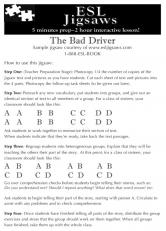ESL Jigsaws
5 Minutes Prep - 2 Hour Interactive Lesson!
Viewing entries tagged with 'ESL'
Writing About Household Repairs
I'm a big fan of using picture dictionaries to teach ESL, particularly to beginner and intermediate levels. Oxford Picture Dictionary, Heinle, Word By Word, I use them all. While they are all excellent and worth purchasing, my favourite is the Oxford Picture Dictionary because the pictures are so clear and pleasing. They also have different levels.
Bargaining Language & Soft Skills
Bargaining (or haggling) takes place all over the world. North Americans often think of it as restricted to places like flea markets or garage sales, when in fact bargaining takes place in a wide variety of business transactions. Think of the negotiation involved in the purchase of expensive items, such as cars or real estate.
Mother's Day
Many teachers who teach English as an additional language are mothers. In the spirit of thanks to mothers everywhere, I'm sharing a couple pages from my low beginner holidays book for free, to use in your class. I hope you find them useful.
Expanding on “Where Do You Live?
“Where do you live?” is one of the personal info questions teachers start with when teaching absolute beginner ESL. Once students have moved past the absolute beginner stage, it’s fun to move beyond that question and get really specific. Where in the world do you live? Where are you now?
Page Directions for Low Beginner ESL
I've created an interactive activity for low beginner ESL to practice page directions. You'll find your class runs smoother when you can draw students' attention to where the class is looking on the page you're working on and make sure everyone is following. You're welcome to download my materials for free to use in your classroom.
Low Beginner Personal Info Game
Anyone who teaches very low beginner ESL knows that you spend a lot of time going over basic personal information questions and answers, often trying to come up with yet another new way to approach the same old material.
Something Different for Valentine's Day (or after)
Callan's Holiday Jigsaws 1 (for beginners) and 2 (for intermediate) each have a Valentine's Day jigsaw. The jigsaw includes a board game on love and romance that students have a lot of fun with. American Holiday Jigsaws 1 and American Holiday Jigsaws 2 have the same lesson for Americans.
Teaching Family to Level One
Were you aware that not all languages use the same one word for father's sister and mother's sister the way English uses aunt? Likewise, many languages have different words for the grandmother from your father's side and the grandmother from your mother's side. Learning about these differences in nomenclature makes teaching a family unit in an ESL classroom an interesting experience.
Should Death Be a Topic in Your ESL Class?
As Veterans Day and Remembrance Day approach, it’s the time of year when we often think about those who have passed away. Should death be a topic in the ESL/EFL classroom? There is no question the topic has to be approached with sensitivity. We don’t know when a loss in the family may be recent for some students. While talking about death can trigger sad feelings, the far less controversial topics of Mother’s Day and Father’s Day are often as loaded for some and must be approached with equal sensitivity.
How Are ESL Books Priced?
Sometimes teachers I speak to at conferences mention that all their colleagues at other schools have my books and so I must be retired now, living off the proceeds of my books. This always inspires a laugh! Other times, teachers comment on how they wonder why photocopiable books are so expensive. Surely, the author or publisher must be making a lot of money at these prices?


